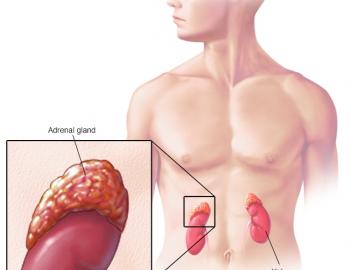Primary aldosteronism (al-DOS-tuh-ro-niz-um) is a hormonal disorder that leads to high blood pressure. It occurs when your adrenal glands produce too much of a hormone called aldosterone.
Your adrenal glands produce a number of essential hormones, including aldosterone. Usually, aldosterone balances sodium and potassium in your blood. But too much of this hormone can cause you to lose potassium and retain sodium. That imbalance can cause your body to hold too much water, increasing your blood volume and blood pressure.
Treatment options include medications, surgery and lifestyle changes.
Symptoms
Primary aldosteronism often doesn't cause clear symptoms. The first clue that you may have primary aldosteronism is usually high blood pressure, especially hard to control blood pressure.
Sometimes, primary aldosteronism causes low potassium levels. If this happens, you may have:
- Muscle cramps
- Weakness
- Fatigue
- Headache
- Excessive thirst
- A frequent need to urinate
Causes
Common conditions that can cause too much aldosterone include:
- A benign growth in an adrenal gland
- Overactivity of both adrenal glands
There are other, much rarer causes of primary aldosteronism, including:
- A cancerous growth on the outer layer of the adrenal gland
- An inherited condition that causes high blood pressure in children and young adults
Diagnosis
If your doctor suspects primary aldosteronism, you'll likely have a test to measure levels of aldosterone and renin in your blood. Renin is an enzyme released by your kidneys that helps control blood pressure. If your renin level is very low and your aldosterone level is high, you may have primary aldosteronism.
Additional tests:
If the aldosterone-renin test suggests primary aldosteronism, you'll need other tests to confirm the diagnosis and look for potential causes. Possible tests include:
- Salt-loading test. There are a few ways to do this blood or urine test. You may eat a high-sodium diet for a few days or you could have a saline infusion for several hours before your doctor measures your aldosterone levels. You may also be given fludrocortisone — a drug that mimics the action of aldosterone — in addition to the high-sodium diet before the test.
- Abdominal CT scan. A CT scan may find a tumor on your adrenal gland or show an enlarged adrenal gland that suggests the gland is overactive.
- Adrenal vein blood test. A radiologist draws blood from both your right and left adrenal veins and compares the two samples. If only one side has elevated aldosterone, your doctor may suspect a growth on that adrenal gland.
This test involves placing a tube in a vein in your groin and threading it up to the adrenal veins. Though essential for determining the appropriate treatment, this test carries the risk of bleeding or a blood clot in the vein.
Treatment
Treatment for primary aldosteronism depends on the underlying cause. The basic goal is get your aldosterone levels back to normal or to block the effect of high aldosterone to prevent complications.
Treatment for an adrenal gland tumor
An adrenal gland tumor may be treated with surgery or medications and lifestyle changes.
- Surgical removal of the gland. Surgical removal of the adrenal gland with the tumor (adrenalectomy) is usually recommended. Surgical removal may bring blood pressure, potassium and aldosterone levels back to normal. Your doctor will follow you closely after surgery and progressively adjust or eliminate your high blood pressure medications.
Risks of surgery include bleeding and infection. Adrenal hormone replacement isn't necessary because the other adrenal gland can make enough of all the hormones your body needs.
- Aldosterone-blocking drugs. If your primary aldosteronism is caused by a benign tumor and you can't have surgery or prefer not to, you can be treated with aldosterone-blocking drugs called mineralocorticoid receptor antagonists (spironolactone and eplerenone) and lifestyle changes. High blood pressure and low potassium will return if you stop taking your medications.
Treatment for over activity of both adrenal glands
A combination of medications and lifestyle modifications can effectively treat primary aldosteronism caused by over activity of both adrenal glands.
- Medications. Mineralocorticoid receptor antagonists block the action of aldosterone in your body. Your doctor may first prescribe spironolactone (Aldactone). This medication helps correct high blood pressure and low potassium, but may cause other problems.
In addition to blocking aldosterone receptors, spironolactone may inhibit the action of other hormones. Side effects can include male breast enlargement (gynecomastia) and menstrual irregularities in women.
A newer, more-expensive mineralocorticoid receptor antagonist called eplerenone (Inspra) eliminates the sex hormone side effects associated with spironolactone. Your doctor may recommend eplerenone if you have serious side effects with spironolactone. You may also need other medications for high blood pressure.
- Lifestyle changes. High blood pressure medications are more effective when combined with a healthy diet and lifestyle. Work with your doctor to create a plan to lower the sodium in your diet and keep a healthy body weight. Getting regular exercise, limiting the amount of alcohol you drink and stopping smoking also may improve your response to medications.










